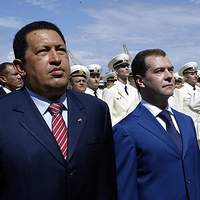Venezuelan President Hugo Chavez's latest visit to Moscow resulted in a package of arms and energy deals that highlight the mutually beneficial nature of the current Russian-Venezuelan relationship.
Facing declining purchases from traditional arms clients, such as India and especially China, Russia has sought to compensate by expanding arms sales to new markets, including in Latin America. For the most part, however, Russian sellers have not been able to achieve major successes, despite Latin American countries doubling the volume of weapons they purchased between the periods of 1999-2003 and 2004-2008. Although the share of Russian arms exports going to Latin America between these periods did jump from 1 to 7 percent, the rise has been due largely to the purchases of one country: Venezuela.
The Venezuelan interest in Russian arms, meanwhile, stems from the arms embargos imposed by the United States against the left-wing government of President Hugo Chavez, which culminated in a total ban in May 2006. Prior to these sales restrictions, Venezuela imported almost 80 percent of its defense equipment from the United States and Western Europe. From 2005 to 2007, however, Venezuela signed a dozen contracts with Russia to buy a total of $4.4 billion worth of weapons. The deals involve helicopters (50 Mi-28Ns), jet fighters (24 Su-30MK2s), and anti-aircraft systems (the TOR-M1). Other major purchases have included combat helicopters (10 Mi-35s), heavy transport helicopters (3 Mi-26s), multirole helicopters (40 Mi-17s), and hundreds of thousands of rifles, including AK-47 and AK-103 models.

